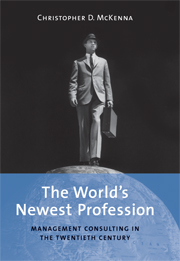Book contents
- Frontmatter
- Contents
- Series Editors' Preface
- Acknowledgments
- Introduction. Making a Career of Consulting
- 1 Economies of Knowledge: A Theory of Management Consulting
- 2 Accounting for a New Profession: Consultants' Struggle for Jurisdictional Power
- 3 How Have Consultants Mattered? The Case of Lukens Steel
- 4 Creating the Contractor State: Consultants in the American Federal Government
- 5 Finding Profit in Nonprofits: The Influence of Consultants on the Third Sector
- 6 The Gilded Age of Consulting: A Snapshot of Consultants Circa 1960
- 7 The American Challenge: Exporting the American Model
- 8 Selling Corporate Culture: Codifying and Commodifying Professionalism
- 9 Watchdogs, Lapdogs, or Retrievers? Liability and the Rebirth of the Management Audit
- Conclusion.The World's Newest Profession?
- Notes
- Index
Conclusion.The World's Newest Profession?
Published online by Cambridge University Press: 18 August 2009
- Frontmatter
- Contents
- Series Editors' Preface
- Acknowledgments
- Introduction. Making a Career of Consulting
- 1 Economies of Knowledge: A Theory of Management Consulting
- 2 Accounting for a New Profession: Consultants' Struggle for Jurisdictional Power
- 3 How Have Consultants Mattered? The Case of Lukens Steel
- 4 Creating the Contractor State: Consultants in the American Federal Government
- 5 Finding Profit in Nonprofits: The Influence of Consultants on the Third Sector
- 6 The Gilded Age of Consulting: A Snapshot of Consultants Circa 1960
- 7 The American Challenge: Exporting the American Model
- 8 Selling Corporate Culture: Codifying and Commodifying Professionalism
- 9 Watchdogs, Lapdogs, or Retrievers? Liability and the Rebirth of the Management Audit
- Conclusion.The World's Newest Profession?
- Notes
- Index
Summary
At the end of the twentieth century, academic and journalistic coverage of consulting took off as the leading management consulting firms exploded in size and prominence. After Business Week's cover proclaimed that there was an ongoing “Craze for Consultants,” journalists published a popular exposé on management gurus, The Witch Doctors, and a tell-all book on the large consulting firms, Dangerous Company. Simultaneously academics, emboldened by the “critical management studies” movement in business schools, began to analyze the broad theoretical and institutional implications of the rapid growth in management consulting. This swell of interest in management consulting stood in stark contrast to the isolated, intermittent studies that had preceded it. Ever since the modern form of management consulting had first emerged in the 1930s, the academic analysis of consulting had not only been sporadic, but also disconnected from the preceding scholarship. In the 1990s, however, management consulting became the focus of an active group of scholars across a variety of academic disciplines. Management consulting finally had a serious academic following even if consultants still viewed the field's development as a recent phenomenon.
This new scholarship on consulting took a different tack from the older, spasmodic analysis. In the 1950s, when Richard Paget, of Cresap McCormick and Paget, addressed the management consultants at Booz Allen & Hamilton on the anniversary of the firm's founding and Homer Hagedorn, a doctoral student in history at Harvard, wrote his thesis on the historical evolution of consulting, they each analyzed the extent to which consultants had achieved professional status.
- Type
- Chapter
- Information
- The World's Newest ProfessionManagement Consulting in the Twentieth Century, pp. 245 - 252Publisher: Cambridge University PressPrint publication year: 2006

